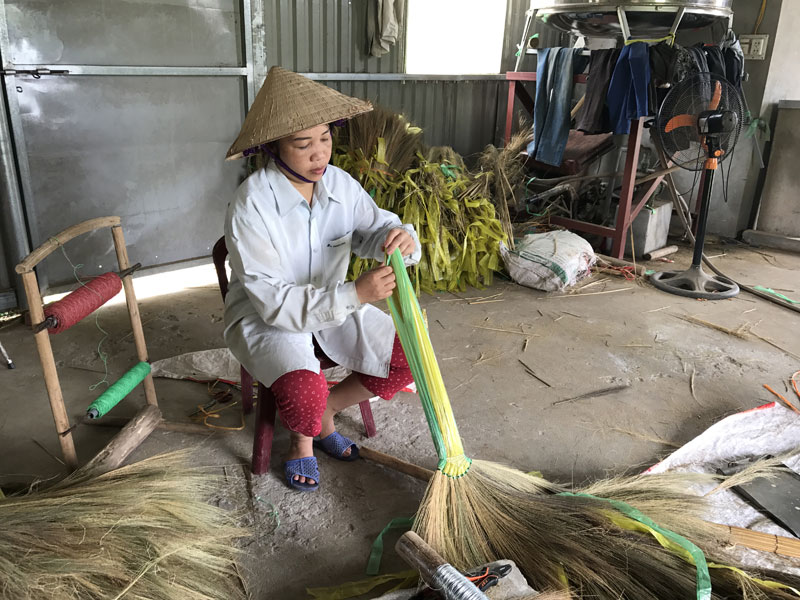
(HBG) – The making of "chit” brooms in Hop Thinh commune (Ky Son) has developed strongly in recent years, bringing stable incomes for many households. "Chit” broom-making workshops have generated jobs for a lot of farmers in post-harvest time.

The "chit” broom-making workshop of Le Thi Nuong (Tu Do hamlet, Hop
Thinh commune, Ky Son district) produces 2,000-3,000 brooms each month with
high economic efficiency.
In 2005, "chit” broom-making appeared at a small
scale in some hamlets. At first, several households made brooms for use at home
and retail sales. Recognising the strong consumption potential of the item,
many families have engaged in broom-making. Since then, this job has grown strongly
in Hop Thinh commune. So far, the commune has had nearly 20 big and small
"chit” broom-making workshops, becoming a main occupation that brings high
economic benefits to many households.
We visited the broom-making workshop of Nguyen
Thi Dao (Doc Lap commune), one of the pioneers in making "chit” brooms in the
commune, as introduced by communal officials. At present, her family has three
broom production workshops, creating jobs for 15 full-time labourers and nearly
20 seasonal ones with the average income of 3 million VND per person per month.
Dao said "I got involved in making brooms by chance. In 2004, when visiting a
relative in Yen Bai who is working at a rattan- bamboo knitting export company,
I was introduced to broom-making and found this job quite simple and easy to
do, suitable with the rural environment. After discussing the occupation with
my family members, I decided to learn to make "chit” brooms as a means of
living.” In 2005, Dao used 30 million VND, which came from her family and the Bank
for Social Policies, to buy equipment and materials. Due to meagre capital, in
the first year, she just imported five tonnes of "chit” material. Dao and her
husband made brooms by themselves and sold them in the local market. Thanks to
good quality and reasonable prices, the products were quickly sold out. At that
time, each broom was sold at 5,000 VND, and excluding all expenses, Dao’s
family could manage to pay all debts. So far, each of her broom-making workshop
exports around 6,000-7,000 brooms each month to
China,
the
Republic of
Korea,
and
Malaysia.
We also visited the "chit” broom-making workshop
of Le Thi Nuong (Tu Do commune). Getting involved in broom-making three years
ago, each month her workshop could produce 2,000-3,000 brooms. The wholesale
prices range from 17,000 VND to 20,000 VND per broom. Excluding the production
cost, the workshop brings her family an annual income of over 100 million VND.
Nuong said "To develop in the long run, it is necessary to have stable "chit”
material sources. At present, I’m buying "chit” mainly from Dien Bien province.
The best material is selected from January to February when "chit” flowers have
yet to bloom. This trade is not too heavy, but it requires diligence. It’s okay
to make brooms at any time, so many farmers learn to make brooms after their
harvest time.”
Vice Chairman of the People’s Committee of Hop
Thinh commune Nguyen Van Thiet said to ensure the stable outlets for the
products, it is necessary to mobilise people to join the production and establish
a cooperation group or a cooperative to build own brand names for the products.
Local authorities should continuously create favourable conditions for farmers
to access loans to expand production to increase their income as well as
generate jobs for local residents.
Hoang
Anh
Since the beginning of this year, under the direction of the Department of Agriculture and Environment, the Sub-Department of Agricultural, Forestry, and Fishery Product Quality Management has strengthened the integration of the professional activities to promote and guide the organizations and individuals in the production and trading of agricultural, forestry, and fishery products to comply with the legal regulations regarding the use of chemicals, pesticides and veterinary medicines in crop cultivation, livestock farming and aquaculture. They also provide guidance to processing and manufacturing establishments on keeping the records to trace the product origins and using food additives from the approved list according to the regulations.
Hoa Binh province saw a significant rise in state budget revenue in the first two months of 2025, heard a meeting chaired by Vice Chairman of the provincial People’s Committee Quach Tat Liem.
Ha Thi Ha Chi, a 26-year-old graduate in law, has taken an unconventional path by returning to her hometown in Mai Chau district to establish the Tong Dau Cooperative, creating stable jobs for local women and bringing Thai ethnic brocade weaving to the global market.
As the Lunar New Year 2025 approached, pork prices surged, creating a profitable season for farmers in Tan Vinh commune, Luong Son district. Taking advantage of the rising demand, Can Minh Son, a farmer from Coi hamlet, sold over 30 pigs at 69,000 VND/kg, each weighing more than 100 kg. After deducting expenses, his family earned a profit of over 50 million VND.
alternate member of the Central Party Committee, Secretary of the Hoa Binh provincial Party Committee Nguyen Phi Long on March 5 had a working session with Yan Jiehe, Founder and Chairman of the China Pacific Construction Group, one of China's largest private corporations in the field of transport infrastructure. Deputy Secretary of the provincial Party Committee, Chairman of the provincial People's Committee Bui Duc Hinh and leaders of provincial departments and sectors also attended the working session.
The electronic printed circuit board (PCB) manufacturing and processing plant of Japan’s Meiko Group, located at Da River Left Bank Industrial Park in Hoa Binh city with a total investment of over 200 million USD, is expected to create thousands of jobs and make a significant contribution to the local budget.



